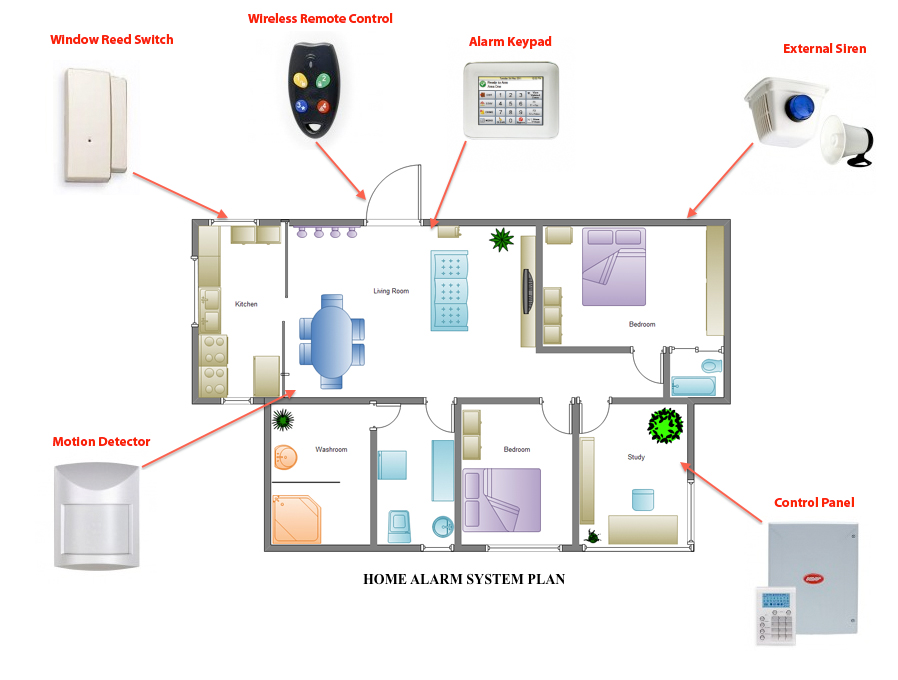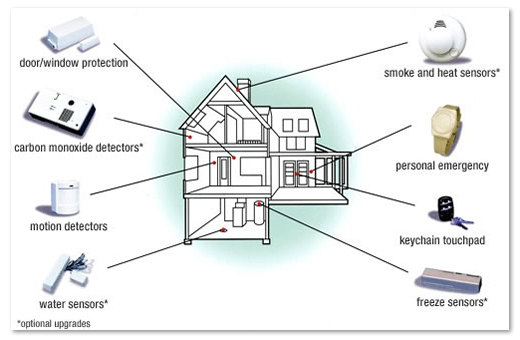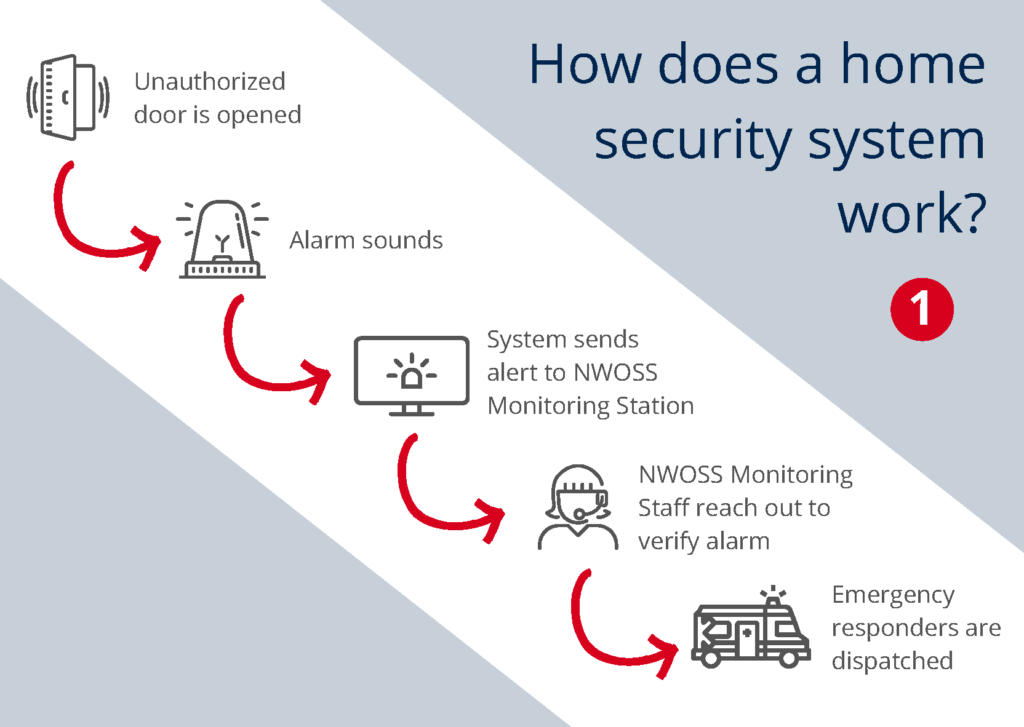Home security systems protect homes from intruders. They use technology to keep you safe.
But how do they actually work? Home security systems are a combination of devices designed to monitor and protect your home. They often include cameras, alarms, and sensors. These components work together to detect any unusual activity or break-ins. When something suspicious happens, the system alerts you or a monitoring service.
This prompt response helps prevent theft or damage. Understanding how these systems operate can help you choose the right one for your home. In this blog, we will explore the basics of home security systems. Discover how they function to keep your home secure. Learn about the different features that can offer peace of mind.

Credit: dfsservices.co.in
Introduction To Home Security
Home security systems are an essential part of safeguarding your sanctuary. Imagine the peace of mind knowing your home is protected while you enjoy a night out or a weekend away. In today’s world, securing your home isn’t just about locking doors; it’s about creating a comprehensive shield against potential threats.
The Need For Security
Why do you need a security system? It’s simple: safety is paramount. A security system acts as a deterrent to burglars and provides an immediate alert if there’s a breach. Think about your valuables, your loved ones, and the memories you’ve built. Aren’t they worth protecting?
Crime rates fluctuate, but the need for security remains constant. Even in seemingly safe neighborhoods, unexpected events can happen. You can’t predict everything, but you can prepare. A security system helps you sleep better at night, knowing that your home is monitored.
Evolution Of Security Systems
Security systems have come a long way from simple locks and bars. Today, they are sophisticated networks of sensors, cameras, and alarms. Early systems were basic, often relying on manual checks and keypads. Now, technology has transformed security into a smart, automated process.
Consider how advancements like smartphone integration and AI-driven analytics have changed the landscape. You can control your security system from anywhere, receiving real-time alerts right on your phone. It’s like having a virtual guardian watching over your home.
Have you ever wondered about the future of home security? Innovations continue to emerge, making these systems more user-friendly and effective. As technology advances, you should stay informed to ensure your home remains protected against new threats.
Does your current security system meet your needs, or is it time to upgrade? Reflect on how these systems have evolved and what features could enhance your home’s safety.

Credit: www.safeguard-va.com
Components Of Security Systems
Understanding the components of home security systems is essential. Each part works together to protect your home. These components provide a strong defense against intruders.
Sensors And Detectors
Sensors and detectors are crucial in home security. They detect motion, smoke, and glass breakage. Motion sensors alert when someone enters a secured area. Smoke detectors warn of fire hazards. Glass break detectors alert when windows break. These devices protect your home from various threats.
Cameras And Surveillance
Surveillance cameras monitor your home 24/7. They capture video footage and offer real-time views. Cameras can be placed indoors and outdoors. They deter intruders and provide evidence if needed. Modern cameras have night vision and motion detection features. They ensure your home is always under watchful eyes.
Types Of Security Systems
Choosing the right home security system can be daunting with so many options available. Understanding the types of security systems is crucial in making an informed decision. Each system has its unique features tailored to different needs and preferences. Let’s dive into the specifics of wired systems and wireless solutions.
Wired Systems
Wired security systems are often seen as the traditional choice. They require a network of wires to connect sensors to the central control panel. This setup ensures a stable connection with minimal interference. Imagine the peace of mind knowing your security system is less susceptible to signal disruptions.
Installation can be complex, as it often involves drilling and routing wires through walls. However, once installed, you can enjoy reliable security that doesn’t rely on batteries or wireless signals. Wired systems are perfect for homeowners who prefer a permanent and robust solution.
Wireless Solutions
Wireless systems offer flexibility and ease of installation. These systems use radio signals to communicate between the sensors and the control panel. They are ideal for renters or those who move frequently, as they can be installed without permanent alterations to your home.
Think about the convenience of placing sensors exactly where you need them without the hassle of wiring. Wireless solutions often come with mobile apps, allowing you to monitor your home remotely. This means you can check in while on vacation or during a busy workday. Does your current setup allow for such convenience?
Both wired and wireless systems come with their pros and cons, catering to different lifestyles and preferences. Consider your living situation and future plans when choosing the best security system for your home. What features matter most to you in safeguarding your space?
Alarm And Alert Mechanisms
Understanding how home security systems work can offer peace of mind and a sense of control over your surroundings. A key component of these systems is the alarm and alert mechanisms, which play a vital role in ensuring your safety. These mechanisms are designed to notify you—and sometimes others—of potential security breaches, allowing for timely responses to threats. Let’s explore how these alarms and alerts function and why they’re essential.
Sound Alarms
Sound alarms are the loud, piercing notifications that you might associate with traditional security systems. They serve as a deterrent, often scaring off intruders before they can cause harm. Imagine a scenario where you’re asleep, and a loud alarm suddenly jolts you awake. This immediate alert gives you the chance to assess the situation quickly. Plus, it can notify neighbors, prompting them to check on your safety or call for help.
These alarms aren’t just about noise; they can be customized to fit your needs. You might choose a simple door chime for less intrusive alerts or a full-blown siren for serious threats. Think about your home layout and decide what level of noise is appropriate.
Silent Alerts
Silent alerts provide an extra layer of security, especially for more discreet situations. They work by sending notifications directly to your phone or security service without making a sound. This can be particularly useful if you suspect ongoing suspicious activity and want to monitor it without tipping off the intruder.
Consider silent alerts as your secret weapon. They allow you to act swiftly and strategically. With these alerts, you can contact authorities or take other measures without alerting the person causing the breach. Ask yourself: How would you react if you received a silent notification? Would you feel more empowered knowing you have control over the situation?
By understanding these alarm and alert mechanisms, you can tailor your home security system to fit your lifestyle and specific needs. Whether you prefer the booming sound of alarms or the subtlety of silent alerts, knowing your options helps you take proactive steps toward a safer home environment.
Smart Home Integrations
Smart home integrations have transformed home security systems. They connect various devices for seamless protection. You can now control security devices with ease. These integrations bring convenience and efficiency to home safety. They allow you to manage security from anywhere. Let’s explore two key features of smart home integrations.
Voice Control Features
Voice control features enhance home security systems. They enable hands-free operation through voice commands. Devices like Amazon Alexa and Google Assistant are popular. You can arm or disarm your system with a simple command. This feature adds an extra layer of convenience. It ensures quick responses during emergencies. Voice control also makes security accessible to everyone.
Mobile App Connectivity
Mobile app connectivity is another vital feature. It allows you to monitor your home remotely. These apps provide real-time alerts and notifications. You can view live camera feeds on your phone. Adjust system settings from anywhere. Mobile apps enhance control over your security system. They offer peace of mind when you are not home. This connectivity is crucial for modern home security.
Installation And Setup
Setting up a home security system can seem daunting, but it doesn’t have to be. With the right guidance, you can have your home secured in no time. Whether you choose professional installation or a DIY approach, understanding the process is key to ensuring your system works effectively.
Professional Installation
Opting for professional installation can save you time and headaches. Experts handle everything from wiring to connecting devices, ensuring each component functions perfectly. This option is ideal if you’re not comfortable with technology or if your system is complex.
Professional installers also provide valuable advice on where to position cameras and sensors for optimal coverage. They can identify potential vulnerabilities that you might overlook. Plus, they often offer ongoing support, which can be a lifesaver when troubleshooting issues.
Diy Setup Tips
DIY setups can be cost-effective and satisfying. Start by reading the manual thoroughly; it’s your best friend in this process. Gather all tools and components before you begin to avoid unnecessary delays.
Position your devices carefully. Place cameras in high-traffic areas and sensors on entry points like doors and windows. Test each component as you go along to ensure everything works as expected.
Don’t rush the process. Take your time to avoid errors. If you’re unsure about any step, online tutorials can be a great help. DIY setups not only save money but also give you a deeper understanding of your security system.
Whether you go with professional installation or take the DIY route, remember that the goal is to make your home safer. What’s your preferred method for installing a home security system? Share your thoughts or experiences in the comments below!
Monitoring Services
Understanding monitoring services is essential for home security systems. These services ensure your home remains safe and secure. They provide real-time alerts and constant surveillance. Monitoring services can be tailored to suit individual needs. Homeowners can choose between self-monitoring and professional monitoring options.
Self-monitoring Options
Self-monitoring lets you keep an eye on your home. Alerts are sent directly to your smartphone or computer. You can check cameras and sensors anytime. This option is cost-effective. It offers flexibility and control over your security system. You receive notifications about any unusual activities. Quick response to alerts is crucial for safety.
Professional Monitoring Services
Professional monitoring services provide 24/7 surveillance. Experts monitor your system continuously. They respond to alarms and alerts promptly. This service offers peace of mind. Professionals contact emergency services if needed. It ensures a swift response to any security breach. Monthly fees are usually required for these services. Many homeowners prefer this for added security.

Credit: nwoss.com
Future Of Home Security
The future of home security is advancing quickly. With technology on the rise, keeping homes safe has never been easier. Modern systems offer more than just alarms. They provide complete protection. Let’s explore what the future holds for home security.
Advancements In Technology
Technology is changing home security systems. Smart sensors detect movement and sound. They alert homeowners instantly. Cameras now offer high-definition images. These cameras can recognize faces. They know who is at the door.
Wireless systems are on the rise. They need no wires or cables. They are easy to install and manage. Cloud storage is also becoming popular. It saves video footage securely online. Homeowners can access it anytime, anywhere.
Emerging Trends In Security
Security trends are evolving. Integration with smart home devices is one trend. Lights, locks, and cameras work together seamlessly. Voice assistants control security features. They make managing security easy and hands-free.
Another trend is the use of artificial intelligence. AI predicts potential threats. It enhances the accuracy of alerts. Homeowners receive only the most relevant notifications. Biometric security is also gaining traction. Fingerprint and retina scans ensure only authorized access.
These advancements and trends promise a safer future. Home security is becoming smarter and more efficient. It adapts to meet the needs of every household. As technology grows, so does our peace of mind.
Frequently Asked Questions
How Does A Home Security System Work?
A home security system detects unauthorized entry using sensors and cameras. It alerts homeowners through alarms and notifications. Systems may include door/window sensors, motion detectors, and surveillance cameras. Central control panels manage alerts, and some systems offer professional monitoring for emergency response.
Regular updates ensure optimal protection.
Do Home Security Systems Really Deter Burglars?
Yes, home security systems deter burglars by increasing the risk of being caught. They provide visible deterrents, like cameras and alarms, that make homes less appealing targets. Burglars often avoid homes with security systems, as they prefer easier opportunities. Investing in a security system enhances your home’s safety.
Do Home Security Systems Work Without Wi-fi?
Yes, home security systems can work without Wi-Fi. Many use cellular connections for monitoring. Wired systems also function independently of Wi-Fi. These options ensure security even during internet outages. Always check compatibility with your chosen system.
Is There A Monthly Fee For Home Security System?
Home security systems often have monthly fees for monitoring services. Costs vary by provider and features. Typically, fees range from $10 to $50. Some systems offer DIY options with no monthly fee, but they may lack professional monitoring. Always compare plans to find one that fits your budget and security needs.
Conclusion
Home security systems protect your home and provide peace of mind. They detect intrusions, alert authorities, and deter burglars. You can choose from various systems to fit your needs. Many options include cameras, sensors, and alarms. Smart home integration adds extra convenience.
With regular updates, your system remains effective. Investing in security is a wise decision. It ensures safety for your loved ones and belongings. Stay informed and choose the right system for your home. Understanding how these systems work helps you make better choices.
Keep your home safe and secure every day.










